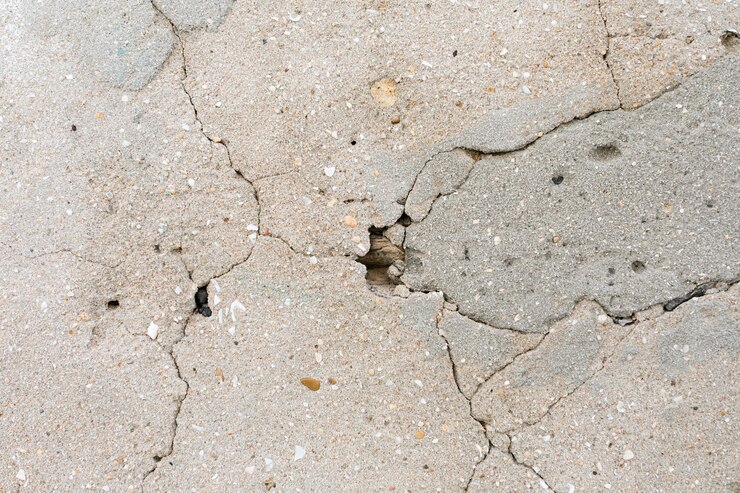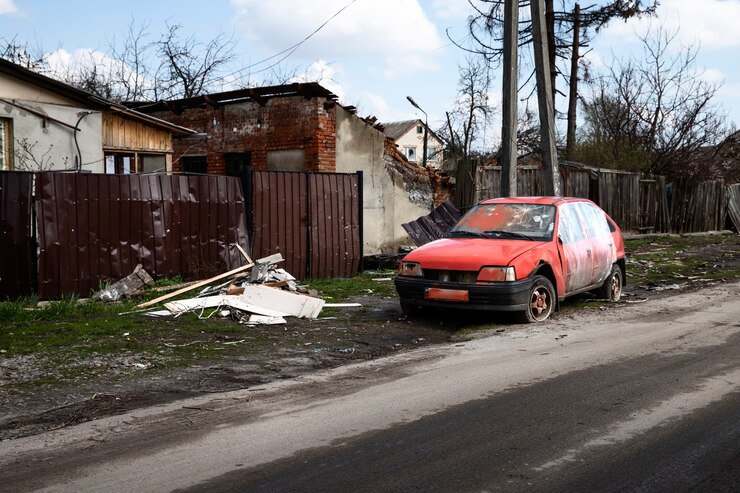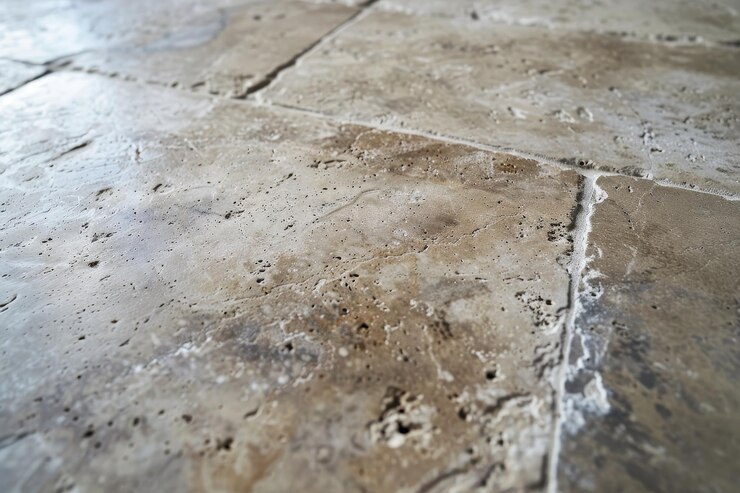Home insurance typically does not cover driveway damage. However, homeowners may be able to add coverage for driveway damage through a separate endorsement or policy extension.
A driveway is considered part of the property’s landscaping, and damaged caused by wear and tear or natural disasters may not be covered under standard home insurance policies. It’s important for homeowners to review their policy and speak with their insurance provider to determine if driveway damage coverage is available and if it meets their specific needs.

Understanding The Coverage Of Home Insurance Policies
Home insurance is designed to provide coverage for various types of damages and losses that can occur to your property. However, it is essential to understand what exactly is covered under your home insurance policy. In this section, we will explore the different types of damages covered by home insurance, debunk common misconceptions, and emphasize the importance of reviewing your policy details.
Different Types Of Damages Covered By Home Insurance:
- Structural damage: Home insurance typically covers structural damage caused by covered perils such as fire, lightning, windstorms, or hail. This includes damage to your home’s foundation, walls, roof, and other structural components.
- Contents damage: Home insurance also provides coverage for damage to your personal belongings, including furniture, appliances, electronics, and other valuable items. Whether it’s due to theft, fire, or other covered perils, your home insurance can help replace or repair these items.
- Liability coverage: Accidents happen, and if someone gets injured on your property, home insurance can provide liability coverage. This includes medical expenses, legal fees, and damages if you are found responsible for the injury.
- Additional living expenses: In the event that your home becomes uninhabitable due to a covered peril, home insurance can help cover additional living expenses. This includes hotel bills, meals, and other necessary costs incurred while your home is being repaired or rebuilt.
Common Misconceptions About What Home Insurance Covers:
- Driveway damage: Contrary to popular belief, home insurance generally does not cover damage to driveways caused by regular wear and tear, age, or neglect. However, if the damage is a result of a covered peril like a fallen tree or vehicle collision, you might be eligible for coverage.
- Flood damage: Many homeowners mistakenly assume that home insurance covers flood damage. In reality, standard home insurance policies usually exclude coverage for floods. However, you can purchase separate flood insurance to protect your home against flood-related damages.
- Earthquake damage: Similar to flood damage, earthquake damage is typically not covered under standard home insurance policies. If you live in an area prone to earthquakes, it is advisable to consider purchasing additional earthquake insurance.
Importance Of Reviewing Your Home Insurance Policy Details:
It is crucial to review your home insurance policy details to fully understand the extent of coverage provided. By doing so, you can:
- Identify coverage gaps: Revisiting your policy will help you identify any potential gaps in coverage that you may need to address. This allows you to customize your policy with additional coverage options to suit your specific needs.
- Ensure adequate coverage: By thoroughly examining your policy, you can ensure that you have adequate coverage limits to replace or repair your home and belongings in the event of a covered loss.
- Evaluate deductibles and premiums: Reviewing your policy helps you understand the deductibles and premiums associated with your coverage. This knowledge empowers you to make informed decisions and potentially save on costs without compromising on protection.
Understanding the coverage of your home insurance policy is essential to ensure you have adequate protection for your property and belongings. By familiarizing yourself with the different types of damages covered, debunking common misconceptions, and reviewing your policy details, you can make informed decisions and have peace of mind knowing you are adequately protected.
Evaluating Driveway Damage Coverage
Does Home Insurance Cover Driveway Damage
Examining The Typical Coverage Included In A Home Insurance Policy:
- Dwelling coverage: Home insurance typically covers damage to the physical structure of your house, including the driveway, caused by covered perils such as fire, hail, or wind.
- Other structures coverage: This coverage extends to structures on your property separate from your main dwelling, such as driveways, fences, or detached garages.
- Personal property coverage: While personal belongings like vehicles usually aren’t covered, damage to items permanently fixed to the driveway, like light fixtures or security gates, may be covered under personal property coverage.
- Liability coverage: Home insurance not only protects your home and property but also provides liability coverage if someone is injured on your driveway.
Determining If Driveway Damage Falls Under Property Or Liability Coverage:
- Property coverage: Damage caused by natural disasters or accidents, such as a fallen tree or a car accident, can be covered under property coverage.
- Liability coverage: If someone is injured due to a hazard on your driveway, liability coverage may come into play. This includes scenarios like slips, falls, or car accidents caused by a poorly maintained or defective driveway.
Reviewing Specific Scenarios Where Driveway Damage May Be Covered:
- Storm damage: Home insurance may cover the cost of repairing or replacing the driveway if it’s damaged by a storm, such as hail or a fallen tree.
- Accidental damage: If a vehicle accidentally crashes into your driveway, causing significant damage, the property coverage of your home insurance policy may cover the repairs.
- Legal liability: If someone visiting your property falls on a cracked or poorly maintained driveway and gets injured, the liability coverage of your home insurance policy may cover their medical expenses and potential legal costs.
Remember, coverage specifics vary depending on your insurance provider and policy terms. It’s essential to review your policy and consult with your insurance agent to understand the extent of coverage for driveway damage under your home insurance policy.
Factors That Affect Driveway Damage Coverage
**age and condition of the driveway:**
- The age and condition of your driveway play a crucial role in determining whether it is covered by your home insurance policy.
- Markdowna well-maintained, relatively new driveway is more likely to be covered for damages, while an older, deteriorated driveway may have limited coverage.
- Markdowncertain policies may consider cracks, potholes, or other signs of wear and tear as pre-existing conditions that are not covered.
**causes of damage, such as natural disasters or accidents:**
- Markdownhome insurance typically covers damages to your driveway caused by accidents or natural disasters, but it’s essential to review the specifics of your policy to understand the scope of coverage.
- Natural disasters like earthquakes, floods, or storms may result in significant driveway damage.
- Markdownaccidents, such as a vehicle collision or a falling tree branch, can also lead to driveway damage covered by your home insurance policy.
**additional coverage options for specific damages:**
- Markdownto ensure comprehensive coverage for specific damages to your driveway, you may need to explore additional coverage options.
- Markdownsome insurance providers offer endorsements or riders that extend coverage for specific situations, such as damage caused by water backup or sewer issues.
- Markdownother options include coverage for property improvements or detached structures that cover damages to your driveway.
- Markdownbefore making any decisions, it’s crucial to consult with your insurance provider or agent to understand the available options and their suitability for your needs.
Remember, each home insurance policy may have different coverage specifics, so it’s essential to review your policy and discuss any concerns or questions with your insurance provider. By being aware of the factors affecting driveway damage coverage, you can make informed decisions to protect against unexpected expenses related to driveway repairs or replacements.
Making A Claim For Driveway Damage
Discovering that your driveway has been damaged can be frustrating and overwhelming. Whether it’s due to natural disasters like storms or accidents caused by vehicles, it’s important to understand how your home insurance can help you in such situations. Making a claim for driveway damage is a process that involves a few key steps, including contacting your insurance provider and documenting the damage.
In this section, we will explore these steps and provide insights into the claim process and potential outcomes.
Steps To Take When Discovering Driveway Damage:
- Assess the damage: Carefully examine your driveway to determine the extent of the damage. Look for cracks, potholes, or any other signs of deterioration.
- Take photographs: Capture clear images of the damage from multiple angles. These photographs will serve as crucial evidence during the claim process.
- Contact your insurance provider: It’s essential to notify your insurance provider as soon as possible after discovering the driveway damage. Most insurance policies require prompt reporting.
- Provide necessary information: Be prepared to provide your policy details, a detailed description of how the damage occurred, and any supporting documents or photographs.
- Follow the instructions given: Your insurance provider will guide you through the claim process, which may involve submitting additional documentation or getting estimates for repairs.
Contacting Your Insurance Provider And Documenting The Damage:
- Inform your insurance provider: Reach out to your insurance company’s claims department and inform them about the driveway damage. Provide accurate and detailed information to ensure a smooth claims process.
- Note down the time and date: Document the date and time of the conversation with your insurance provider for future reference.
- Describe the damage: Clearly explain how the driveway damage occurred and provide any pertinent details you may have.
- Submit photographic evidence: Provide your insurance provider with the photographs you took, clearly showing the damage from various angles.
- Record the claim number: Make a note of the claim number provided by your insurance provider. This number will serve as an important reference throughout the claim process.
Understanding The Claim Process And Potential Outcomes:
- Claims assessment: Once you have reported the driveway damage, an adjuster will assess your claim. They will evaluate the extent of the damage and determine if it falls within the coverage of your policy.
- Repair estimates: Your insurance provider may require you to obtain repair estimates from qualified contractors. These estimates will help determine the amount of coverage provided for the repairs.
- Policy coverage: Review your insurance policy to understand the coverage for driveway damage. It’s important to be aware of any limitations, deductibles, or exclusions that may affect your claim.
- Claim settlement: If your claim is approved, your insurance provider will provide compensation according to the terms of your policy. The settlement amount will depend on factors such as the extent of damage, deductibles, and policy limits.
- Reconstruction or repair: Once the claim is settled, you can initiate the process of repairing or reconstructing your driveway. Ensure that you hire reputable contractors and keep all receipts and records of the repairs for future reference.
Remember, every insurance policy may have different terms and conditions regarding driveway damage coverage. It’s crucial to review your policy and seek clarification from your insurance provider to fully understand the claim process and potential outcomes.
Tips For Preventing Driveway Damage
Driveways are an essential part of our homes, providing a convenient space for parking, as well as adding curb appeal to our properties. However, they are often overlooked when it comes to home insurance coverage. So, does home insurance cover driveway damage?
In this section, we will explore some tips for preventing driveway damage and maintaining its durability.
Regular Maintenance And Inspections
- Regularly inspect your driveway for any signs of damage, such as cracks, potholes, or crumbling edges.
- Clean your driveway regularly to remove debris, leaves, and other materials that can accumulate and cause damage over time.
- Consider applying a sealant to your driveway every few years to protect it from the elements, including harsh weather conditions and uv rays.
- Fill any cracks or potholes promptly to prevent them from expanding and causing further damage.
- Remove any oil stains or chemical spills as soon as possible, using suitable cleaning products and techniques.
Using Suitable Materials And Construction Techniques
- When constructing or repairing your driveway, choose high-quality materials that are suitable for the climate and expected vehicle traffic.
- Ensure that the base of the driveway is properly prepared and compacted to provide a stable foundation.
- Follow the recommended thickness and slope guidelines to ensure proper water drainage and prevent pooling or erosion.
- Consider using reinforcement techniques, such as installing steel mesh or fiber additives, to enhance the strength and durability of the driveway.
Addressing Potential Hazards Or Issues Promptly
- Keep an eye out for any potential hazards near your driveway, such as overhanging trees with heavy branches or roots that could cause damage over time.
- Promptly address any issues or problems that may arise, such as water drainage issues, uneven surfaces, or loose pavers.
- Regularly trim overhanging branches and remove tree roots that could potentially affect the stability of the driveway.
- Consider installing bollards or barriers to protect your driveway from accidental damage caused by vehicles or other equipment.
By following these tips for preventing driveway damage, you can help ensure the longevity and durability of your driveway. Regular maintenance and inspections, using suitable materials and construction techniques, and addressing potential hazards or issues promptly are essential for preserving the integrity of your driveway and avoiding costly repairs in the future.
Frequently Asked Questions For Does Home Insurance Cover Driveway Damage
Does Home Insurance Cover Driveway Damage?
Yes, in most cases, home insurance covers driveway damage caused by covered perils such as fire, vandalism, or severe weather events. However, it may not cover wear and tear or damage caused by negligence. It’s best to check your specific policy and coverage limits to be sure.
What Types Of Driveway Damage Are Typically Covered By Home Insurance?
Typically, home insurance covers driveway damage caused by covered perils like vehicle collisions, falling trees, or vandalism. However, damage caused by regular wear and tear or lack of maintenance may not be covered. It’s important to review your policy and consult your insurance provider for specific coverage details.
Are There Any Limitations To Home Insurance Coverage For Driveway Damage?
Yes, there may be certain limitations to home insurance coverage for driveway damage. Some policies may have coverage limits or exclusions for specific types of damage. It’s important to review your policy carefully and understand any limitations or exclusions that may apply to your driveway damage coverage.
What Steps Should I Take If My Driveway Gets Damaged?
If your driveway gets damaged, you should take the following steps:
1. Document the damage with photographs. 2. Contact your insurance provider to report the damage and initiate a claim. 3. Obtain repair estimates from licensed contractors. 4. Follow any guidelines or procedures provided by your insurance company. 5. Keep records of all communication, receipts, and repair documentation for the claim process.
Can I Claim Driveway Damage On My Home Insurance Without Affecting My Premium?
It depends on the circumstances and your insurance provider’s policies. In some cases, making a claim for driveway damage may not impact your premium. However, if you have multiple claims or a history of claims, it could potentially affect your premium.
It’s best to consult with your insurance provider for specific information regarding claims and premiums.
How Can I Prevent Driveway Damage?
To prevent driveway damage, consider the following steps:
1. Regularly inspect your driveway for cracks, potholes, or other signs of damage. 2. Clean your driveway regularly to prevent the buildup of debris or substances that can cause damage. 3. Avoid parking heavy vehicles or machinery on your driveway. 4. Take steps to protect your driveway from extreme weather conditions. 5. Promptly address any issues or damage to your driveway to prevent further deterioration.
Conclusion
It’s important to understand the extent of coverage provided by your home insurance policy when it comes to driveway damage. While most policies do cover driveways, the extent of coverage may vary depending on the cause of the damage. It’s essential to carefully review your policy and consult with your insurance provider to ensure you have the necessary coverage in place.
Remember, home insurance typically covers damage caused by certain perils like fire, theft, vandalism, or natural disasters. However, wear and tear, neglect, or damage caused by an uninsured driver may not be covered. If your driveway is damaged due to any of these reasons, you may need to explore other options such as filing a claim with your auto insurance or considering separate coverage for your driveway.
Ultimately, being proactive in understanding your home insurance policy and taking steps to protect your driveway can help you avoid unexpected expenses. Regular maintenance, repair, and diligent communication with your insurance provider are key to ensuring adequate coverage for driveway damage.




